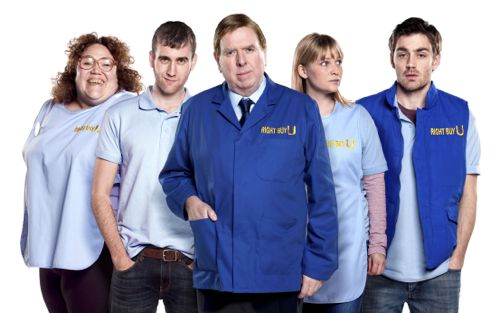
“THERE’S a lot of worries about at the moment.
“I can look at poverty and wealth. That’s what this series gives me the ability to be able to do.”
Can money bring you happiness?
Writer Kay Mellor has something to say about that in BBC1 drama The Syndicate, which begins at 9pm tonight (Tuesday March 27).
The five-part series focuses on a group of five workers at a small local supermarket which is about to be closed down.
Money worries spark a drastic course of action for some.
And then they win £18m in the Mercury Millions lottery, giving them more cash than they ever dreamed of.
It’s a drama very much for our time, with a cast including Timothy Spall, Joanna Page, Lorraine Bruce, Matthew McNulty and Matthew Lewis.
I’ve been a fan of Kay’s writing ever since Band of Gold.
First interviewing her when I attended the launch for the very first series of Playing The Field in 1998.
And, along with other members of the media, spoke to Kay again at a recent London post-screening question and answer session.
My transcript is below.
***********************************************************************
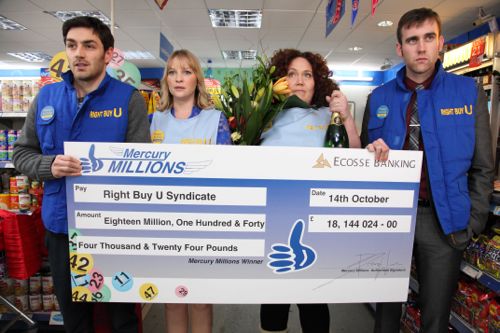
Kay Mellor Q&A:
What inspired you to write this series and what themes do you explore?
“I think the thing that really inspired me to write it – the phrase kept coming up over and over again…it was a bit like with Fat Friends, people started talking about weight constantly…everybody I spoke to would be saying things like, ‘Well you never know, I might win the Lottery this week.’ I had a friend who works for a small dance group and they were funded by the Arts Council. There was that week when the Arts Council grants were going to be cut. And I remember looking at her and I could see she was worried. She said, ‘I’ll probably be made redundant at the end of next week.’ And I went, ‘What are you going to do Linda?’ And she said, ‘Well I’m either going to win the Lottery or I’m going to take up bungee jumping.’ And I looked at her and could see that she passes it off lightly, because that’s who she is. But actually she was really worried. She’s a woman in her fifties, where’s she going to get another job? There are a lot of worries about at the moment. And so I’m hearing that phrase more and more. So I thought, ‘I wonder what it would be like if a group of people win the Lottery? Ordinary working class people in this present climate.’”
Why did you choose that particular figure as the winning amount?
“Because I didn’t want it to be so much that it was ridiculous. I wanted it to be enough to get them out of a situation but also so that you could see an end to it, perhaps. So it was quite difficult because it could have been £40m, it could have been £8m. But I wanted it just to be enough – £3.6m (each) is life-changing but at the same time if you’re reckless with it, it can go. So it seemed like a perfect amount.”
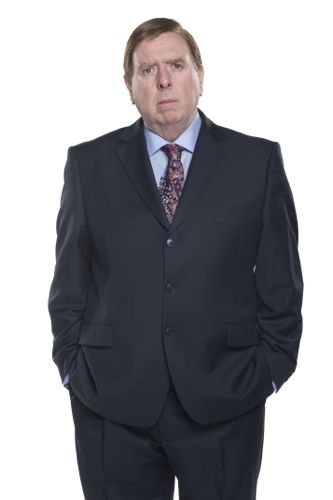
Filmed in Leeds? Locations?
“This particular one is very near Armley jail. They’re dotted around Leeds. You don’t have to search that hard. There are a lot of people living like that. That’s not far away from my background, how I was brought up in a prefabricated council estate. So that’s how they are. I know that territory.”
Did you talk to anyone who’s had a life-changing win?
“Yeah. I spoke to quite a few people. About six winners in all I spoke to.”
What surprised you most about what they said?
“I think the biggest thing that shocked me, actually, was how long the euphoria lasts. Which is actually not very long. Six days, somebody said to me. They felt euphoric for six days until other problems started to happen. It’s not all a rosy story. That’s what I found out very quickly. Because when I read around it, around Lottery winners, a lot of it was books that had been put out by Camelot and by Lottery companies. And they’re all wonderful stories of people that have had the most fantastic time since winning the Lottery. But actually it’s not always true.”
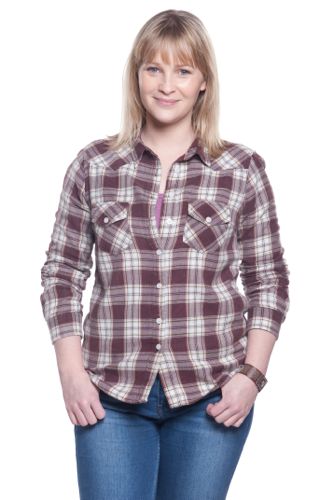
Did you hear from anyone who wished they hadn’t won?
“Yes I did. It was quite a fine balance. One woman said to me, ‘I wish I’d not gone public.’ A lot of people said. ‘And I wish I’d given it all away straight away. Paid my mortgage and given the rest away.’ Everybody wanted to pay their mortgage off and get rid of their debts. But then after that a lot of people talked about the responsibility of money. About who to give the money to. And these are themes that I explore within the piece about money, new-found wealth.”
Why did she want to give it all away?
“It caused problems within her family. She gave some money to her son because he was having financial problems and they were going to repossess his house. The daughter had found out and said, ‘Why?‘ She tried to be duplicitous. The whole family had become fractured. And she hadn’t seen her grandchildren. It caused a massive fracture within the family and tensions.”
What are the most common problems that people talked about?
“Not knowing how much to give. Are they going to be over-generous or stingy? How do you give somebody £100 when you’ve won £4m. But yet £100 is a lot of money. All your references change.”
Should people that have committed crimes be eligible to win such huge amounts of money?
“How would you monitor it? If you follow this series you’ll see what I do feel about it. About comeuppance…I think in the scheme of things, if you believe in a law of karma or whatever, you’ll get it. You don’t need to be forbidden to buy a Lottery ticket to do that. That’s what I would say. You reap what you sow. But that’s just a personal feeling.”
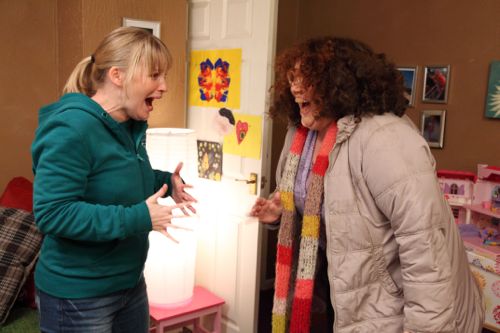
Did you discuss what you’d do – you and fellow cast members – with a Lottery win?
“I know the crew were suddenly doing the Lottery and picking all my numbers. And I was going, ‘Hey, I’m not responsible if you don’t win.’”
Did they win anything?
“No. I would have wanted a part share if they had.”
What would you do if you did win £4m, say, on the Lottery?
“I’d probably pay a lot of my friends and my daughters’ mortgages off. And get them out of debt. There’s a lot of people around me, friends of mine, that are in debt and in worry. So I’d have loved to have been able to give Linda, my friend, I’d love to be able to say, ‘Hey, you’ve got no mortgage, no debts.’ That must be a lovely thing to do.”
What would you buy for yourself?
“I’d probably take a world cruise or something like that. I feel like I’ve won the Lottery. I do a job which I absolutely love. That’s why I don’t do it. Because if I did win the Lottery I really wouldn’t know what to do other than give it away, give it to people that mattered. I feel every day like I’ve won the Lottery because I paid for doing what I’d do for free.”
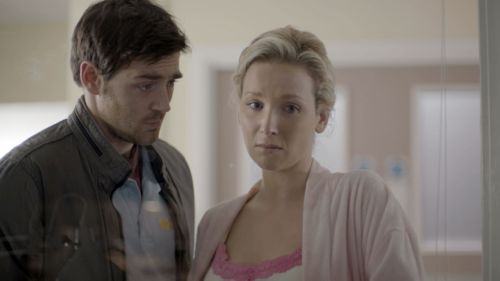
What do you think about the current obsession with period dramas?
“I think there needs to be a balance. That’s what I feel. We are leaning a lot towards bonnets and period. As long as there is a happy balance then there’s room for everything. I’d like to explore Charlotte Bronte, what her real life was like in Haworth back then. Because I think it would be interesting to look at that. But I think I come at it from a slightly different perspective, that’s all. But I don’t think it’s always good to have your head in the sand. I think that’s what we as a society have had – our head in the sand for a long time. And I think it’s quite good to kind of go, ‘This is a different type of a drama and this is a kind of bring your head up a bit. This is what’s going on.’ At the same time it has an element of escapism to it because they win the Lottery. Only it’s different because I can look at poverty and wealth. That’s what this series gives me the ability to be able to do.”
It’s been a long time since Band of Gold, Fat Friends and Playing The Field? It’s as if we haven’t seen this kind of drama from you in particular for a decade?
“I’ve been doing quite a bit of theatre. I did A Passionate Woman, which was in the Fifites. I just felt I had something to say now. It’s no good just writing for the sake of it. I just felt that I really wanted to say this. It was a bit like with Band of Gold – it (The Syndicate) was inside me…rather than somebody asking me to write something about it.”
What’s your view of the Lottery?
“I think it can be a good thing, particularly when money is channelled into things like the arts and parks and working with disabled people. I know lots of organisations that are partially funded by the Lottery money – and films. Historically films have been – and still are, I think – partially funded. And that’s a good thing. I think when you get people, though, on a low income spending £20 of their money – maybe they get £100 a week if they’re lucky – on the Lottery…that’s a worry for me. So it doesn’t always sit comfortably with me, to be honest.”
Do you think more people will buy Lottery tickets when they watch this?
“Probably. There lies the irony.”
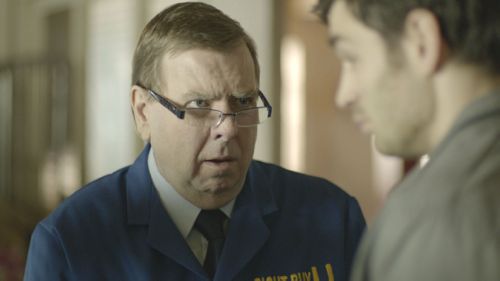
Have you had any interaction with Camelot at all? Have they given you any feedback on what they think about the drama?
“I did initially contact Camelot. But then very quickly I backed away from them because I realised that, obviously, they want me to tell huge positive stories about people that have won the Lottery. And as a dramatist I’ve got to be able to tell what I want to tell. So I backed off really quickly and then went my own routes trying to find people to talk to. And just employing my own imagination and also devising my own Lottery company – Mercury Millions – which doesn’t exist. But then I spoke to people who had won the Lottery.”
But Camelot will be pleased?
“They may be pleased now…ask me again when episode five’s done.”
Have they been back in touch with you at all?
“They did send me books and try to get back in touch but…I backed off. I suddenly realised when they sent me this book and I went, ‘Oh great, I’ve got a book from them.’ And then I looked in it and thought…six fantastically positive stories about winning the Lottery. Which is great. Obviously they’re not going to send me a book that says, ‘Six awful things happened to me after I won the Lottery.’ But that’s not to say there isn’t some wonderful things…in this it looks at light and shade and there’s humour and there’s some positive things that happen from winning the Lottery. There’s also some negative things.”
The supermarket in the drama. A real supermarket?
“Yes. Round the corner from where I live. Right Buy U is our company. So we changed it all. The only day that they could close was on a Sunday, so we worked Sundays. I didn’t want it to be a big supermarket. I thought it was really important that it was like a small local supermarket, like a Spar or a Co-op or something like that. Because I wanted all the workers to be in the syndicate. So I thought five. I went round various shops asking how many people worked there. And then I thought I knew where to pitch it.”
Lottery wins can bring out skeletons and people from the past?
“I think money does, doesn’t it? If you’ve got a load of money, who’s going to come crawling out of the woodwork? There is that. But also I thought, ‘Well, what if you wanted to be anonymous? What if you didn’t want publicity? Because that was quite interesting talking to people – why they’d gone public. And it seemed to me the most natural and sensible thing to do was not to go public. But yet they do. For all sorts of reasons, largely to do with the fact that the Lottery company want them too, of course. So they’re under a lot of pressure to go public.”
How do they try to encourage them to go public?
“They say things to them like, ‘You can share it with all your friends and family and share the good news.’ Rather than telling people. And you can also go out and buy a new car. You can really enjoy it. And they say things like, ‘No, you won’t get begging letters,’ and, ‘No, this won’t happen.’ All this sort of thing. ‘Celebrate with all your friends and family.’ Some people believe it.”
People give up their jobs?
“That’s the difficult thing. What do you do if you give up work and you’re a young man or a young woman?”